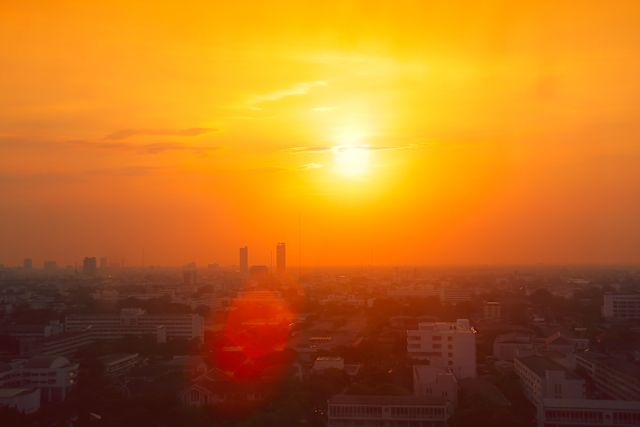Updated on January 20, 2026.
Heat waves have become increasingly common and extreme in recent decades. In fact, there were more than 2,300 deaths in the United States caused by extreme heat in 2023, according to the Centers for Disease Control and Prevention (CDC), a significant spike over previous years. This worrisome trend is expected to continue as the global climate shifts.
Here's what to know about extreme temperatures—and how to protect yourself and your loved ones.
Why weather patterns are changing
The burning of fossil fuels, such as coal and gas, releases carbon dioxide (CO2) into the atmosphere where it accumulates, according to the U.S. Environmental Protection Agency (EPA). Like a blanket, this CO2 traps heat, warming the Earth and its oceans. This process, while it causes temperatures to rise, disrupts the delicate balance of connected ecosystems.
As the planet warms, weather patterns are changing. Warmer air and melting Arctic ice weakens the polar jet stream—the strong band of winds that forms at the point where balmy air from lower latitudes meets the frosty air of the Arctic. Weaker winds cause the jet stream to lose strength and become wobbly, allowing the cold air normally trapped in the Arctic to descend into North America. In recent years, this has resulted in bizarre spring-like weather in the Arctic and freezing temperatures in Europe, adding to mounting concerns about the effects of human-induced climate change.
The temperature of the world’s oceans and the Earth’s atmosphere affects wind and precipitation as well as the circulation of heat. Global warming is influencing the severity, duration, and frequency of heat waves.
How extreme heat affects health
While people can adapt to gradual changes in their environment, they are much more vulnerable to dramatic and unexpected temperature swings. How does this affect the health of people? Extreme heat events can be dangerous—even deadly.
Heat waves can lead to heat-related illnesses, such as heat cramps, heat exhaustion—and in the most extreme cases, heat stroke. Heat stroke occurs when the body is no longer able to regulate its temperature, causing it to rise quickly. Since the body can’t cool down effectively, heat stroke can cause death if a person does not receive immediate medical attention.
Extreme heat can also worsen existing chronic health issues, such as asthma, COPD, and diabetes. It’s linked to heart or respiratory conditions, as well. That's because high temperatures are often associated with higher levels of dangerous air pollutants.
What's more, extreme heat can affect people’s ability to think and work productively. More than 1 billion workers around the world are exposed to extreme heat events, according to a 2021 review published in The Lancet. Of these people, one-third experience negative health effects as a result, the researchers cautioned.
Certain groups are more vulnerable
People who have more trouble regulating their body temperature are more vulnerable to extreme weather events, such as heat waves. Among those at greater risk:
- Babies and young children
- Pregnant people
- Older adults
People who work outdoors and athletes are also more likely to experience the negative health effects of extreme heat waves.
People living in underserved low-income communities are at higher risk for heat-related illnesses, as well. These areas tend to lack consistent air conditioning, access to cool public facilities or pools, and other resources that could ease the health risks of heat waves.
Also more vulnerable to intense heat: people living in crowded cities. Concrete and other human-made surfaces absorb more sunlight during the day and push this heat back out in the evening. The air quality where people live and their mental health also play a role in how susceptible they are to extreme heat events, according to the National Institute of Environmental Health Sciences.
People older than 65 and Black people have had a higher-than-average risk of death from heat-related heart disease than the general U.S. population, the Environmental Protection Agency reports.
How to protect your health
Climate change is coinciding with growth of the aging population. As extreme weather events happen with greater intensity and frequency, this group at high risk for health-related consequences is expanding, The Lancet review points out. The authors noted that without strategies in place to protect against a hotter future, heat-related illness and deaths will increase.
More research is needed to better understand how climate change is affecting human health, the researchers advised. They added that early warning systems, which enable people to anticipate and prepare for extreme weather events, can help protect community health.
Investment in green spaces and new technologies, such as cool roofs (which are designed to reflect more sunlight), can help cities withstand extreme heat. Other measures that may help include:
- Greater access to air conditioning or cooling centers
- Strategic landscape design, such as planting trees or creating urban forests to offer more shade and lower temperatures in public spaces
- Heat alerts that prompt people to hydrate and avoid strenuous outdoor activity during peak sun hours
- Access to public drinking fountains, swimming pools, and spray pads
- Updated building codes to increase energy efficiency
- Investment in green energy, reducing reliance on fossil fuels







